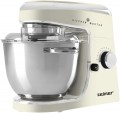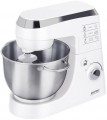Nozzles
— The main bowl. An open capacity designed for kneading dough, whipping cream and mixing masses. The main bowl is included in almost all food processors. It can be made of various materials: plastic, glass, metal, etc.
—
Blender. In this case, it is a bowl narrowed downwards, at the bottom of which there is a bladed knife. Such a device is suitable both for mixing liquids into a homogeneous mass (for example, for making cocktails or batter), and for grinding some solid foods (for example, fruits and vegetables) into a homogeneous puree. The blender is usually installed instead of the main bowl, however, there are devices that allow you to use two bowls at the same time.
—
Food processor. A special capacity for chopping, which is equipped with either a knife for chopping products, or discs for chopping, cutting, French fries. Allows you to cut salads, shred cabbage and perform a number of other operations, depending on the complete nozzles.
—
End-to-end food processor. A special nozzle for installing cutting discs. This accessory allows you to quickly chop vegetables or shred cabbage. Moreover, the final product enters the main bowl (or any other from your kitchen inventory) — there is no separate bowl like in a classic food processor.
—
Meat grinder. The possibility of using the device as a meat grinder
...— for making minced meat, grinding fruits and vegetables. In terms of possibilities, such nozzles are often not inferior to meat grinders made in the form of separate devices.
— Vegetable cutter. A special attachment for cutting vegetables, fruits and mushrooms. Depending on the type, it allows you to cut food: into cubes, slices, sticks, etc. It can be equipped with its own capacity for collecting cuttings.
- Steam cooker. Ability to use the food processor as steam cooker — for steaming food. This method of cooking is considered healthier than classic cooking, it allows you to save a maximum of vitamins and nutrients in the products. Among other things, steaming is often used in the preparation of baby food. Some food processors with this function are originally designed specifically for cooking for children.
— Grinder(for coffee). The grinder with characteristic grinding rods for grinding grains (including coffee beans), oil seed crops, cereals and pulses. It is perfect for making flour. Ussually such attachments have opportunity to adjust the grinding degree.
— Centrifugal juicer. The universal juicer for getting fruit, vegetable and berry juice. Not suitable for citrus fruits (see Citrus juicer). Note that food processor juicers are usually less performant than juicers as separate devices, and therefore are poorly suited for harvesting large amounts of juice.
— Citrus juicer. It is a rotating ledge with a ribbed surface. To get juice, you need to manually put half of the fruit on it with the flesh down and press hard. Due to this procedure, the juice from the flesh is squeezed into the bowl located below, and the peel remains intact.Bowl capacity
The volume of the food bowl provided in the food processor. Most often the full volume is indicated, not the working volume. It should be noted that you can not use the bowl completely when cooking, the working volume is approximately 70% of the total. Thus, about 4 liters can be used in a 6 liter bowl. And if you go into the recipes and power modes of the food processor (see the instructions), then smaller numbers are acceptable for preparing a particular dish (kneading dough, mixing salad, etc.).
Note that a large capacity affects the dimensions and weight of the unit, and also requires a more powerful engine — which affects energy consumption and price. So when choosing a bowl by capacity, you should not chase the maximum capacity, but take into account the planned volumes of work.
Power
Rated power of the food processor. Most of this power comes from the engine — the rest of the unit consumes very little energy. Usually, the
more power, the higher the productivity of the unit, and the less time it takes to process products.
Note that the optimal power value directly depends on the volume of the bowl (see the relevant paragraph): for example, for a 1.5 kg bowl, at least 300 W is desirable, for a two-kilogram bowl — 400 W, a three-kilogram bowl — at least 700 W. And with the same bowl capacity, a more powerful unit will be more productive, it will work faster and better cope with high loads (for example, a full load). On the other hand, an increase in power affects energy consumption and price.
Number of speeds
The number of fixed speeds of rotation of the attachments provided in the design of the food processor. The more of them, the more accurately you can choose the required speed for each specific mode of operation. It is worth noting that some devices do not have fixed speeds — the control is carried out smoothly (see Stepless speed controller)
Pulse mode
The ability to operate the food processor in
pulsed mode, when the motor does not rotate constantly, but with pauses. This mode is particularly useful when processing hard foods, such as frozen fruits and vegetables, to ensure efficiency while reducing engine load.
Body material
The main material used for the body of the unit.
—
Plastic. The main advantage of plastic is the relatively low cost. In addition, this material can have almost any colour, including quite bright ones. In terms of strength and reliability, the plastic is inferior to metal, but this difference does not play a special role in normal use, it becomes noticeable only in various emergency situations (during falls, overheating, etc.). Also, plastic bodies are relatively easy to scratch, but this point mainly affects the appearance of the unit and does not affect the functionality. In light of all this, only plastic is the most popular material for the bodies of modern food processors.
—
Metal. Metal bodies are distinguished by their solid appearance and high strength. On the other hand, this material is noticeably more expensive than plastic, and therefore is less common — mainly in middle and high class food processors.

